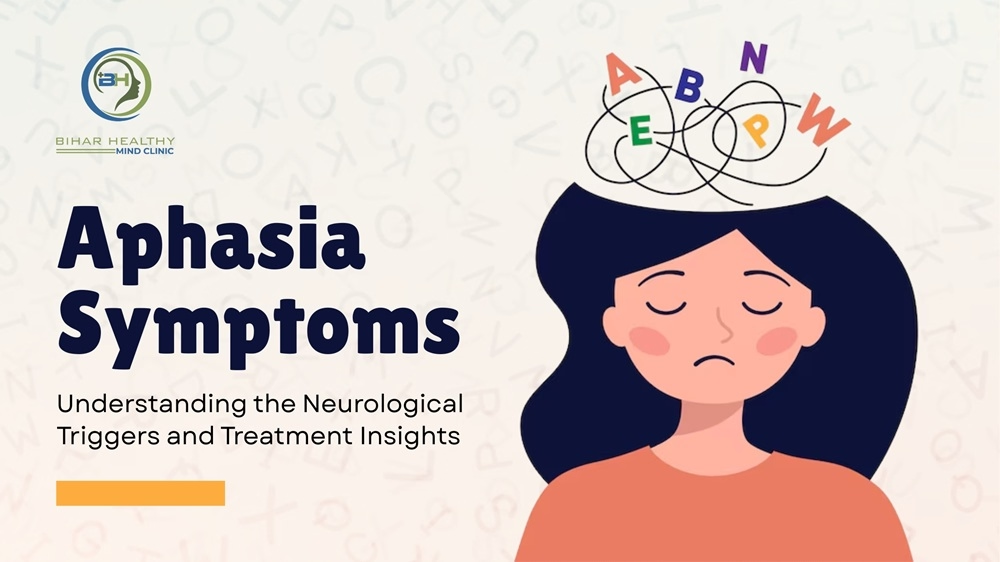
Aphasia is a condition that affects the brain’s ability to process language, making it difficult to speak, understand, read, or write. It interferes with speaking, understanding speech, reading, and writing. While this condition is not related to intelligence, it can be deeply frustrating for both patients and their loved ones. At Patna Psychiatry, we often encounter patients and families struggling to make sense of this disorder. This blog provides a detailed look into what causes aphasia, its symptoms, and how timely psychiatric and neurological intervention can help.
What Is Aphasia?
This condition arises from neurological damage, most often affecting the brain’s language-processing areas, commonly on the left side. It can emerge suddenly, often after a stroke or traumatic brain injury, but it can also develop slowly in cases involving brain tumors, infections, or progressive neurological diseases.
Despite its complex nature, aphasia is not a mental illness or a learning disorder. It is a direct result of brain damage, and it affects how the brain processes language. Identifying the signs of aphasia early plays a vital role in timely and effective treatment.
Common Aphasia Symptoms to Watch For
Early detection of aphasia often leads to more successful outcomes in therapy. Here are some hallmark aphasia symptoms:
- Difficulty speaking or forming complete sentences
- Using incorrect or made-up words (neologisms)
- Trouble understanding spoken or written language
- Mixing up word order or leaving out words
- Inability to name objects or express thoughts clearly
- Challenges in reading or writing coherent sentences
The severity of symptoms can vary widely based on how much and which part of the brain is affected.
Types of Aphasia and Their Unique Characteristics
Aphasia is not a one-size-fits-all diagnosis. Aphasia can be categorized into several distinct types, each with unique characteristics:
Broca’s Aphasia (Non-fluent Aphasia)
Individuals may comprehend spoken language adequately but often face difficulty in speaking clearly or fluently. They often produce short, broken sentences.
Wernicke’s Aphasia (Fluent Aphasia)
Individuals speak in long sentences that may lack meaning or include unnecessary or made-up words, making comprehension difficult.
Global Aphasia
This severe form affects both speech production and understanding. It is often seen right after a significant brain injury or stroke.
Anomic Aphasia
Some people are able to speak and comprehend effectively but frequently struggle to recall specific words, particularly names and action terms.
At Patna Psychiatry, detailed evaluation helps determine the type and severity of aphasia so that a personalized treatment plan can be crafted.
Neurological Triggers Behind Aphasia
Aphasia is mainly triggered by injuries or diseases that impair the brain regions responsible for language. These include:
- Stroke: The most common cause, particularly ischemic strokes that cut off blood supply to brain areas involved in language.
- Traumatic Brain Injury (TBI): Accidents or falls that injure the head can damage language-processing areas.
- Brain Tumors: Tumors in the left hemisphere can compress or infiltrate speech centers.
- Infections: Conditions like encephalitis or brain abscesses may trigger aphasia.
- Neurodegenerative Diseases: Disorders such as primary progressive aphasia (PPA), Alzheimer’s disease, or frontotemporal dementia may slowly erode language skills.
Understanding these triggers is vital for neurologists and psychiatrists to coordinate effective, multidisciplinary treatment.
Diagnosis and Evaluation at Patna Psychiatry
At Patna Psychiatry, led by Dr. Saurabh Kumar, MD (Psychiatry), widely regarded as the Best Psychiatrist in Patna, we begin with a comprehensive clinical evaluation.
- Medical Imaging (MRI/CT scans): Helps locate the damage in the brain.
- Speech and Language Assessment: Certified speech therapists perform evaluations to determine the individual’s communication strengths and weaknesses.
- Cognitive Screening: To identify co-existing impairments in memory, attention, or reasoning.
Accurate diagnosis lays the foundation for a rehabilitation plan that promotes gradual recovery.
Effective Treatment Options for Aphasia
Although aphasia can be challenging, many people show significant improvement with timely intervention. Key treatment components include:
- Speech Therapy: Customized speech therapy remains a central component of aphasia care, focused on rebuilding communication skills.
- Group Therapy: Group-based sessions promote consistent language practice and peer interaction within a supportive setting.
- Family Counseling: Helps families understand the condition and adapt communication techniques.
- Medication: In some cases, medications may be prescribed to improve brain function or manage related conditions like depression or anxiety.
- Neuropsychiatric Support: Continuous psychiatric evaluation ensures emotional well-being during recovery.
At Patna Psychiatry, we also focus on neuroplasticity, the brain’s ability to reorganize and compensate for damaged areas, through mental stimulation, therapy, and compassionate care.
Why Early Intervention Matters
Delays in recognizing aphasia symptoms often lead to prolonged recovery and frustration. Prompt therapeutic support increases the likelihood of restoring speech and language abilities more effectively. Working with a skilled professional like Dr. Saurabh Kumar, the Best Psychiatrist in Patna, ensures a well-rounded, empathetic approach to both the neurological and emotional challenges that come with aphasia./p>
Final Thoughts: Moving Forward with Hope
Aphasia does not define a person, it’s a condition that can be managed with the right support, therapies, and patience. Understanding the neurological basis behind aphasia symptoms is the first step toward effective rehabilitation. If you or a loved one are facing difficulties with communication or language, seeking help from an experienced psychiatric and neurological team is essential.
Patna Psychiatry stands as a pillar of support, offering expert care, advanced diagnostics, and a compassionate environment for recovery. With timely diagnosis and structured therapy, individuals with aphasia can rebuild their communication skills and regain control over their lives.
Disclaimer: All characters and events depicted in this blog are entirely fictional. Any resemblance to actual persons, living or dead, is purely coincidental. The content is intended for informational purposes only and should not be considered as medical advice. Always consult a qualified healthcare professional for medical concerns.
Visitors: 128





No comments yet.